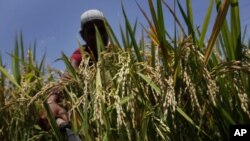A team of scientists is urging that agriculture be a top priority in climate change negotiations, saying it’s vital for global food security and for reducing carbon emissions. The recommendations appear in the January 20th issue of Science magazine.
The international team was led by Sir John Beddington, Britain’s chief scientific advisor. The article, What Next for Agriculture After Durban, follows the latest U.N. climate conference in December. It says negotiations there made “incremental progress” in helping farmers adapt to climate change while reducing agriculture’s contribution to global warming.
“Well, agriculture is important, period, because of the imperative of food security. And we’re falling short there in significant ways that have come to our attention, especially recently with the significant price shocks,” said Professor Molly Jahn of the University of Wisconsin-Madison, co-author of the Science article.
International prices have remained high since the food crisis of 2007/2008.
Agriculture is a major emitter of greenhouse gases. But Jahn said it also offers opportunities to lessen their effects with known and proven farming practices.
“So it represents both an activity that’s essential for our survival -- an activity that is threatened by climate change, especially in vulnerable parts of the world. And an opportunity to better manage meeting our needs while we reduce the emissions of various greenhouse gases that are accumulating in the atmosphere,” she said.
Faster response needed
The Science magazine article says the “integration of agriculture in the climate change negotiating process has moved at a slow pace.” However, it says at the same time climate change, forces affecting food security, and population growth have been moving “much faster.”
The scientists hope to influence policymakers.
Jahn said, “It was important for this team to get together precisely because so much work has been done. There’s so much information about opportunities and options, as well as threats. So this body was convened to carefully, objectively review that vast amount of information and synthesize clear policy relevant recommendations.”
Those recommendations include putting agriculture front and center in policy considerations.
“While we are transitioning to climate-smart agriculture, we need to assure that the world’s most vulnerable people will be considered in any policy strategies,” she said.
Another recommendation is to reduce the vast amount of food that’s lost, wasted or spoiled along the food chain – and to choose crops that place less stress on the environment.
“Given current knowledge, there’s a great deal we can do within current budgets and within current economic structures that will bring us forward to a better place with respect to agricultural practices in the developing and the developed world,” said Jahn.
Playing a bigger role
The magazine article calls on scientists to “assume a more prominent role” by ensuring clear data is available for climate change negotiations. It says that data can help spur investment in agriculture.
Professor Jahn warns “the window of opportunity to avert a humanitarian, environmental and climate crisis is rapidly closing.” She adds urgent action is needed.
Agriculture’s role in climate change is expected to be discussed in June at Rio+20. The meeting in Brazil marks the 20th anniversary of the U.N. Conference on Environment and Development in Rio de Janeiro. It’s commonly known as The Earth Summit.




